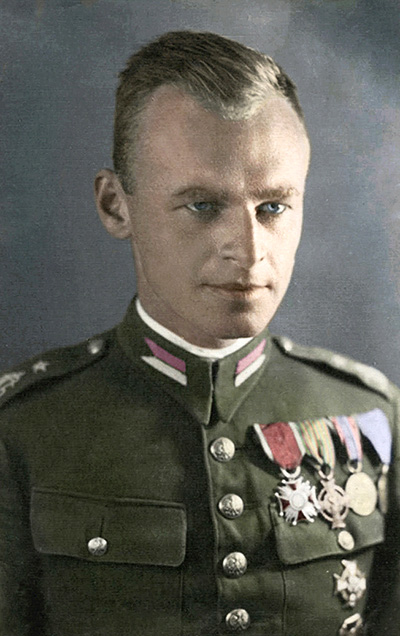Not only were we hit with rifle butts in the head, but also our ideals and values that guided us in life were brutally trampled upon, said Witold Pilecki in his eye-witness account of the arrival at the camp in Auschwitz. Pilecki is one of the greatest heroes in Poland’s history. He volunteered to become a KZ Auschwitz prisoner in order to organise a resistance unit in the camp and pass on reliable information on the fate of its prisoners.
In 1940, the Underground Polish State had only fragmentary intelligence on KZ Auschwitz. A decision was made for the dramatic rumours to be confirmed with eye-witness accounts. The lethally dangerous mission was taken up by Witold Pilecki, a cavalryman and a veteran of the Polish-Soviet War (1919–1921) and the September Campaign of 1939.
On 19 September 1940, he deliberately provoked his capture by the Germans in Warsaw. He entered the notorious gate with the “Arbeit macht frei” inscription on the night of 21 September 1940. The first few days were completely overwhelming. It was as if I had been transported to another planet, said Pilecki on witnessing the unimaginable ruthlessness of the German camp guards.
Tattooed with the number 4859, the new inmate immediately began his clandestine operation. He established an underground resistance unit called the Secret Military Organisation. People under Pilecki’s command encouraged mutual aid and fostered morale among the prisoners; they also provided intelligence to the outside world and prepared their own military units to organise an uprising and seize the camp. The inside knowledge of what was happening in KZ Auschwitz was passed on by Pilecki to the Home Army in the reports dispatched by the inmates Pilecki helped to flee the camp. He escaped KZ Auschwitz after two years of the ordeal.
After leaving the camp, Pilecki wrote a number of reports on what was happening behind the fences and on the activity of his underground organisation. Promoted to the rank of cavalry captain, he continued his struggle against the German invaders as a Home Army soldier and participated in the Warsaw Uprising (1944). Following Warsaw’s capitulation, he was transferred to Lamsdorf and Murnau POW camps. When World War II ended, Pilecki returned to Poland to continue his struggle against the Soviet invaders. He was arrested by the communists on 8 May 1947. After a ruthless investigation that involved brutal torture, he was put on a show trial and was sentenced to death. He was executed on 25 May 1948 with a shot to the back of his head.
The intelligence Pilecki collected in KZ Auschwitz is known to be one of the first eye–witness accounts of the German atrocities. It was used by the legitimate Polish authorities to raise the alarm and to inform the Allied Forces about the tragic situation of the prisoners and the unprecedented genocide occurring in the camps. The Allies were never to react.




